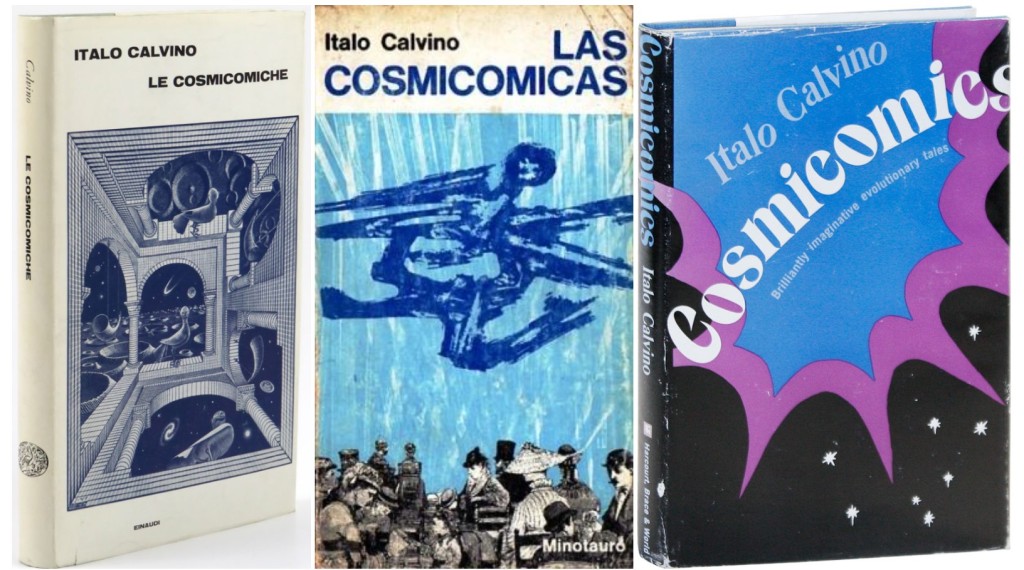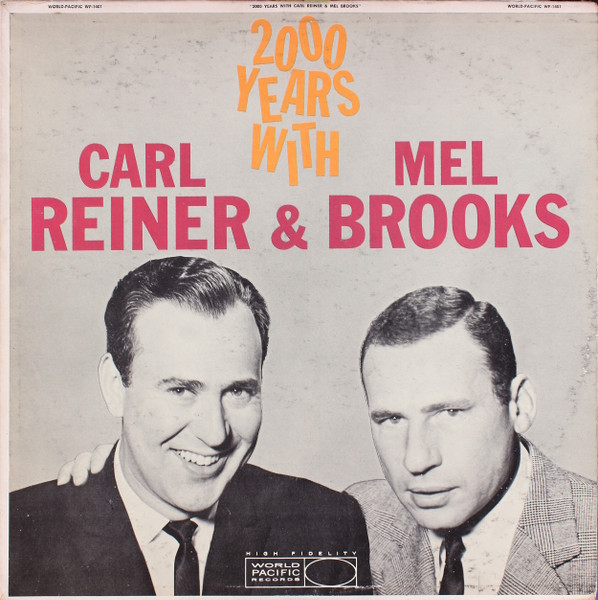
“A Sign in Space” by Italo Calvino is story #25 of 52 from The World Treasury of Science Fiction edited by David G. Hartwell (1989), an anthology my short story club is group reading. Stories are discussed on Tuesdays, Thursdays, and Saturdays. “A Sign in Space” first appeared in Le Cosmicomiche, a collection of the author’s stories first published in Italy in 1965. It was later translated and published in English in 1968 as Cosmicomics.
“A Sign in Space” is not science fiction. I won’t go into my rant again about how I dislike science fiction editors poaching literary works and calling them science fiction. I assume they do it to inflate the reputation of our genre, but I don’t want our genre to gain recognition for the wrong reasons. If Italo Calvino was really considered a science fiction author his success and fame would not have happened.
Be that as it may, let’s discuss “A Sign in Space” as a literary story. As soon as I started reading it I heard the voice of Mel Brooks doing his 2000 Year Old Man routine. Is it possible that Calvino could have heard this 1960 record? Great discoveries are often made at similar times around the world.
I did find a couple audio readings of the story, but none of the readers read it like Mel Brooks. I was disappointed. But here’s a nice narration.
This is a creative work that’s reasonably entertaining. It’s meant to be humorous and clever, but that really depends on the reading and delivery. That’s why I ached to hear Mel Brooks do it as a comedy routine. I did think it was too long.
I imagined the narrator being God when he was a youngster, just figuring things out. Did God create all of reality, or just Earth and its vicinity? Imagine being a conscious being that could ride around the Milky Way as it spun like a record. Imagine that being not having a language and needing to develop one. Making a sign could be the very beginning of the process. There are interesting philosophical points in this story.
Another thing I thought about while reading “A Sign in Space” was wondering how an observer could track the rotation of our galaxy? We see the Earth orbiting the sun through the changing background of the constellations throughout the year. The celestial sphere seems fixed to us when we realize we are moving. Would there be a larger sky outside our galaxy that would seem fixed too?
Just because a writer tells a fantastic story about outer space doesn’t mean we can pin a sign on their back that says SCIENCE FICTION WRITER. Marketing fiction as science fiction is a publishing technique to get certain kinds of stories to certain kinds of readers. It’s often bad for writers. And it’s unfair to writers who have developed a reputation outside of our genre. Some science fiction writers have learned that being labeled a science fiction writer has hurt their career potential. But it doesn’t help them or the genre to go around tagging certain famous writers as science fiction writers.

I wish David Hartwell could have found a genuine science-fiction story from Italy.
James Wallace Harris, 7/1/23
Interesting! It sounds like a scifi story? I’ve never considered what authors tend to write …lol no wonder you were sketchy about Davidson! If someone that normally writes lit fic or history writes a scifi, they aren’t a full-time scifi author but the story is still scifi 🤷♀️
LikeLike
Maybe. Part of my problem is I define science fiction in a certain way. And other people use the term to pigeonhole any weird story.
One of my tenets of science fiction is it should be a story where we believe something fantastic is possible. Even when we don’t believe in the concept. I don’t believe time travel is possible but I want to believe it when I read a time travel story.
Calvino never expects us to believe the events in “A Sign in Space.” He’s just doing an intellectual stand up comic routine. It is good, but I can’t immerse myself into the story like I can with Wells’ “The Time Machine.”
LikeLiked by 1 person
Also, anybody can write science fiction under my definition. George Orwell was no SF writer but 1984 is an excellent SF story.
LikeLiked by 1 person
True. Haha I just re read 1984 a few weeks ago, I actually had a whole thought process on whether or not dystopia / alt future without any science or scifi element other than alt future should be lumped in with scifi 🤣
LikeLike
And wasn’t Orwell’s futuristic world building perfectly believable?
LikeLike
Sounds like SF to me.
Want a great SF story from Italy? Lino Aldani’s “Good Night, Sophie” (1963, trans. 1973). Reviewed on my site.
LikeLike
Read my next post which reviews another Calvino story. It has a quote from an introduction which explains about Calvino’s writing and why it’s not science fiction.
I have “Good Night, Sophie” In The Science Fiction Century – another Hartwell anthology. I’ll check it out. Thanks.
LikeLiked by 1 person
I don’t buy it. I simply don’t care whether or not Calvino thought his stories were or were not SF. Atwood is notorious for claiming that she wasn’t writing SF. If the general perception is that SF is less than (in any manner) to literature than authors will be careful to differentiate what they are writing from the genre… Prehistorical SF is a thing and it sounds like “The Spiral” neatly fits! https://sf-encyclopedia.com/entry/prehistoric_sf
LikeLike
Read “The Spiral” and let me know. It feels more like a philosophical fable or allegory to me. Sort of a atheist-religious take on science.
I can see where you’d think it might be PreHistoric SF, but it’s not like the PreHistoric SF I know and love.
I like Calvino’s stories, and what he’s doing. And if people want to call it science fiction then I can’t stop them. But I consider it a form of shanghaiing or poaching.
I agree, The Handmaid’s Tale is science fiction, whether Atwood calls it that or not. But that’s because it fits all the storytelling conventions science fiction has evolved. Calvino intentionally set out to do something different.
LikeLike
Yes, Calvino feels different as he’s approaching it from the literary mainstream. But it can still be his take on science fiction. I’ve read almost all of Calvino’s short fiction — I must have read that one at some point although my memory is hazy. Invisible Cities is my favorite. It even got nominated for the Nebula — haha.
Tons of science fiction is philosophical (Lem) and allegorical. I don’t know why that vibe somehow disqualifies it from a genre designation.
But yeah, I can imagine that Calvino feels quite a bit different.
LikeLike
Ultimately, I am interested in far more inclusive definitions in order to allow for a more diverse field that moves beyond traditional genre tropes so familiar to us.
LikeLike
I want to evolve and expand for art form of science fiction too. But I consider labeling Calvino science fiction to be like saying I love the sonnet form, but I want it to be more, so let’s rename haikus as sonnets too.
I want to expand the form in the way Babel by R. F. Kuang and The Calculating Stars by Mary Robinette Kowal expands and evolves from Pavane, The Man in the High Castle, and Bring the Jubilee or how British space opera has transformed 1930s space opera.
I know Calvino sounds a lot like science fiction, but I see a distinction that makes his work different. But my opinion doesn’t really count. One vote doesn’t matter in a democracy. It’s what the majority thinks.
Right now I’m more interested in reevaluating 1970s science fiction. I just read The Shockwave Rider and I feel it’s science fiction for adults. I think for a while in the 1970s some writers tried to write adult science fiction, but SF readers never really took to it.
LikeLike
The 70s have long been my favorite SF decade. I’ve been reviewing quite a bit from that era recently… Vonda N. McIntyre, Kate Wilhelm, Russell Bates (a Kiowa SF author), etc.
LikeLiked by 1 person
Check out Domenico Gallo’s Fantascienza Outside the Ghetto: The Science-Fictional Writings of Italian Mainstream Authors. He includes analysis of the Calvino. They did not want themselves connected to a field that many viewed with disdain…
An abstract of the article: “Some of the most important specimens of twentieth-century Italian sf, written by such prestigious mainstream authors as Italo Calvino, Mario Soldati, Ennio Flaiano, Corrado Alvaro, and others, were not published by specialized presses or sf magazines; they were presented as narrativa (fiction) without genre attributes, though they undoubtedly belong to sf. The reasons for this production and circulation of sf outside the “ghetto” have to do with specific aspects of Italian history and culture, which are discussed in the first part of this article. An overview of sf written by authors who are not usually tied to the genre follows, in an attempt to explain how these novels and stories relate to the problematic issue of scientific-technological imagination in Italy from 1900 to the early 1980s and beyond.”
LikeLike